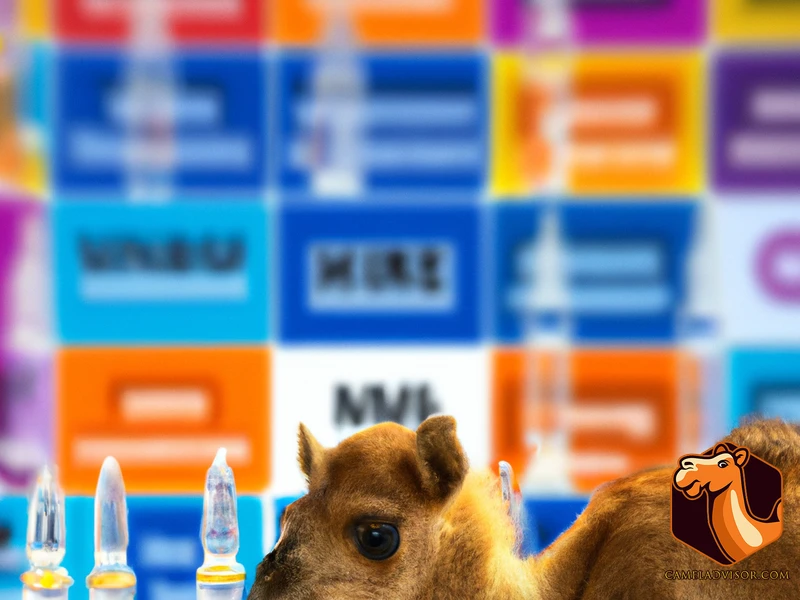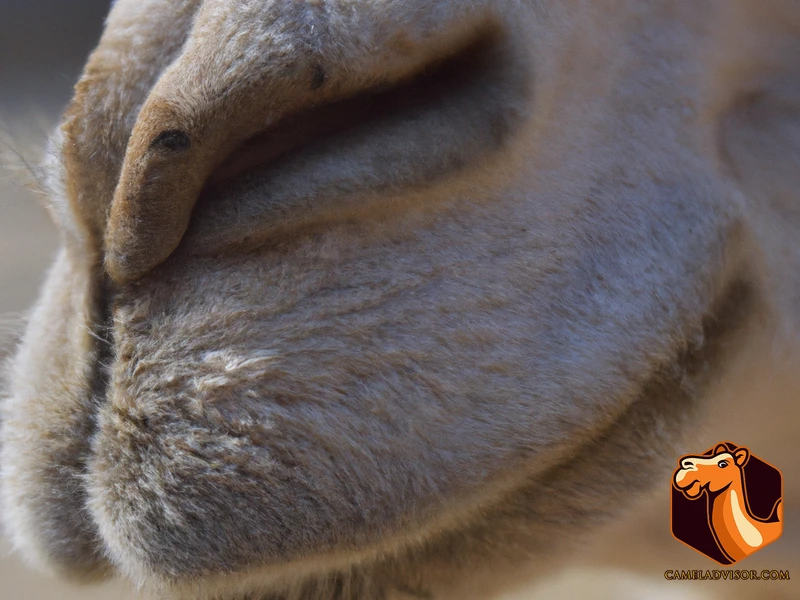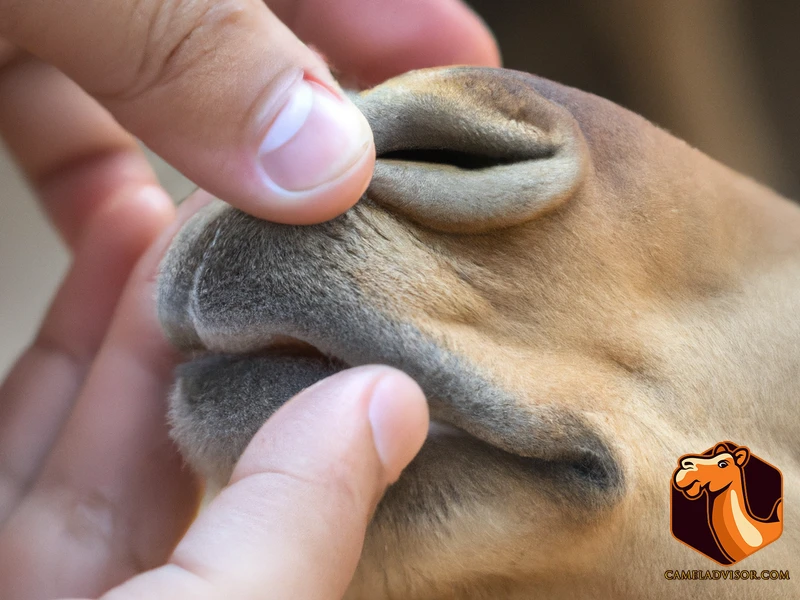As newborn camels are highly susceptible to a wide range of infections and diseases, it can be perplexing for the camel owners to ensure their proper growth and health. However, with proper care and attention, the risk of infections and diseases can be minimized. In this article, we have compiled ten crucial tips to help prevent infections and diseases in newborn camels. These tips cover different aspects of camel care including nutrition, hygiene, vaccination, isolation, exercise, parasite control, temperature regulation, water quality, monitoring, and emergency preparedness. By following these tips, camel owners can ensure the health and safety of their newborns.
Contents
Tip #1: Nutrition

When it comes to caring for newborn camels, ensuring proper nutrition is essential to their growth and overall health. Providing adequate colostrum and a balanced diet are crucial for their wellbeing. Without proper nutrition, newborn camels can suffer from a variety of health problems that can lead to long-term consequences. In this section, we will highlight key tips and strategies for ensuring proper nutrition in newborn camels to prevent health issues and promote optimal growth. For more information on newborn camel care, check out our comprehensive guide.
Provide Adequate Colostrum
Providing adequate colostrum to newborn camels is essential to ensure their health and well-being. Colostrum is the first milk produced by the mother camel and contains essential nutrients, antibodies, and other important components that help newborn camels build their immune system. Without adequate colostrum intake, the young camel may be vulnerable to infections and diseases.
To provide adequate colostrum to newborn camels, you should:
- Ensure the calf receives colostrum as soon as possible: Newborn camels should receive colostrum within the first few hours after birth, as this is the time when their gut is most receptive to the antibodies and nutrients found in colostrum.
- Ensure the quality of colostrum: The quality of colostrum is essential to its effectiveness. Ensure that the mother camel is healthy, and her milk is free from any infections or diseases.
- Make sure the calf receives an adequate amount of colostrum: The calf should consume approximately 10% of its body weight in colostrum within the first 24 hours after birth. This can be achieved by feeding the calf small amounts of colostrum frequently, or by bottle-feeding if necessary.
If the calf does not receive an adequate amount of colostrum, they may be at risk for infections and diseases. In such cases, it is important to consult with a veterinarian or seek advice from a camel care expert.
By providing adequate colostrum to newborn camels, you can help ensure that they are on the path to good health and development. For more information on newborn camel care, visit doc-rec-keep-newborn-cam-care.
Ensure a Balanced Diet
One of the most important factors in preventing infections and diseases in newborn camels is ensuring they have a balanced diet. Without proper nutrition, newborn camels can become weak and susceptible to illness.
An adequate diet for newborn camels should consist of:
| Type of Food | Proportion of Diet |
|---|---|
| Colostrum | First 3 days of life – all milk should be colostrum, 4-14 days – 75-80% colostrum, 14-21 days – 50% colostrum |
| Milk | Rest of the diet after colostrum feeding period |
| Forage | Should be introduced gradually from 3 weeks of age, increase to 5-10% of body weight at 6-8 weeks of age |
| Water | Should be available at all times |
Newborn camels should receive adequate amounts of colostrum, which contains important antibodies that provide immunity against infections and diseases. A deficiency of colostrum can lead to life-threatening illnesses, so it is crucial to provide enough colostrum as soon as possible after birth. More information on the importance of colostrum can be found in our article on newborn camel colostrum importance.
In addition to colostrum, a balanced diet for newborn camels should also include milk, forage, and water. The proportion of each type of food should be adjusted according to the camel’s age.
Forage should be introduced gradually from 3 weeks of age, and increased to 5-10% of body weight at 6-8 weeks of age. It is important to monitor the forage intake to ensure it does not exceed the recommended levels.
Water should be available at all times, as newborn camels require adequate hydration for proper functioning of their bodies.
Ensuring a balanced diet for newborn camels is essential for their growth and development, as well as for preventing infections and diseases. More information on feeding schedules for newborn camels and weaning can be found in our article on feeding schedule for newborn camels and weaning. If you need guidance on bottle-feeding a newborn camel, check out our article on bottle-feeding a newborn camel.
Tip #2: Hygiene
Keeping the environment clean and hygienic is a crucial aspect of ensuring the health and well-being of newborn camels. Poor hygiene can lead to the growth of harmful bacteria, viruses, and parasites that can cause a range of illnesses and infections. It is important to take necessary measures to prevent contamination and maintain a healthy living space for the animals. In the following sections, we will explore some tips for maintaining hygiene in your newborn camel’s surroundings and equipment. For more information on general health problems and solutions for newborn camels, check out our article on newborn camel health problems and solutions.
Keep a Clean Environment
Maintaining a clean environment is vital for preventing infections and diseases in newborn camels. Regular cleaning of the newborn camel’s living area helps to prevent the buildup of harmful bacteria and viruses. To keep the environment clean, make sure to:
- Remove manure and soiled bedding daily: Cleaning up any waste promptly will help to prevent the buildup of bacteria and parasites in the environment. It also ensures that the newborn camel has a clean and comfortable place to rest.
- Replace bedding frequently: Dirty or damp bedding can harbor harmful bacteria and fungi, so it’s important to change it regularly. The frequency of replacement depends on the humidity level and cleanliness of the surrounding environment.
- Disinfect the living area: Regularly disinfect surfaces in the living area to kill any remaining bacteria and to prevent its spread. Use a disinfectant that is safe for animals and follow the instructions correctly to ensure its effectiveness.
- Keep the feeding area clean: The feeding area is also a crucial part of the environment. Keep hay in racks or containers and clean them regularly, as well as any feeding bowls. This prevents contamination of the hay and feed by manure, dust or other debris.
Keeping a clean environment for newborn camels can be challenging, especially if there are many animals in a small space, but it is an essential step in disease prevention. By maintaining a clean living space, you are helping to keep your newborn camel healthy and happy. For more information on newborn camel environment, visit our full guide on newborn camel care, or if you need newborn camel help, contact a professional veterinarian.
Clean and Disinfect Equipment
Clean and Disinfect Equipment
Cleaning and disinfecting equipment is essential in preventing the spread of infections and diseases in newborn camels. Bacteria and viruses can easily survive on equipment, such as feeding bottles, buckets, and pens. It’s important to keep all equipment clean and disinfected between uses.
To properly clean and disinfect equipment, follow these guidelines:
| Step | Procedure |
|---|---|
| Step 1 | Remove all dirt, feces, and organic matter from the equipment. |
| Step 2 | Wash the equipment with hot water and detergent. |
| Step 3 | Rinse the equipment with clean water. |
| Step 4 | Disinfect the equipment with a suitable disinfectant according to the manufacturer’s instructions. |
| Step 5 | Rinse the equipment with clean water again. |
| Step 6 | Dry the equipment completely before using it again. |
It’s important to use a disinfectant that is effective against the specific pathogens that are a concern for newborn camels. Consult with a veterinarian to determine the best disinfectant for your specific situation.
Regularly cleaning and disinfecting equipment will help prevent the spread of disease and ensure the health of your newborn camels. Additionally, it’s important to regularly replace old and worn equipment to prevent the accumulation of bacteria and ensure the equipment is functioning properly.
By following the recommendation of cleaning and disinfecting equipment, you are taking a significant step in raising your newborn camels healthy and happy. For more information on camel care and training, check out our article on /newborn-camel-training/.
Tip #3: Preventive Vaccinations

As newborn camels’ immune systems are not yet fully developed, they are susceptible to various infections and diseases. Thus, it is crucial to take proper preventive measures to safeguard their health. One such measure is to ensure they receive the necessary vaccinations at the right time. By doing this, one can provide adequate protection against potential diseases and illnesses, and ensure the newborn camels’ healthy development. In this section, we will discuss some important tips for carrying out preventative vaccinations for newborn camels.
Consult with a Veterinarian
When it comes to preventive vaccinations for newborn camels, it is important to consult with a veterinarian who specializes in camel health. They can offer advice on the necessary vaccines, help create a vaccine schedule, and provide information about potential side effects.
During the consultation, the veterinarian will assess the health of the newborn camel to determine which vaccines are needed. They may also ask questions about the environment and any possible exposure to diseases. Based on this information, the veterinarian will recommend a specific vaccine schedule that includes the recommended timing and dosage for each vaccine.
It is important to follow the vaccine schedule recommended by the veterinarian to ensure that the newborn camel is protected from diseases. Missing a vaccine or not following the recommended dosage could result in incomplete protection or even vaccine failure.
Additionally, the veterinarian will provide guidance on monitoring the newborn camel for any adverse reactions following vaccination, such as fever or swelling at the site of injection. They can also offer advice on how to handle any potential side effects.
Consulting with a veterinary specialist is an essential step in implementing a successful preventive vaccination program for newborn camels. It can provide peace of mind and ensure the health and safety of the newborn camel.
| Benefits of Consulting with a Veterinarian |
|---|
| Assessment of the newborn camel’s health |
| Recommendations for specific vaccines |
| Creation of a vaccine schedule |
| Guidance on potential side effects |
| Monitoring for adverse reactions |
Follow Vaccine Schedule
One of the most important preventive measures for preserving the health of newborn camels is following a proper vaccine schedule. Vaccines are essential for protecting camels from a host of infectious diseases that can be debilitating or even deadly, including anthrax, foot-and-mouth disease, and viral hemorrhagic septicemia, among others.
Vaccine Type | Vaccine Schedule
— | —
Anthrax | First dose at 3 months, followed by second dose at 6 months, and then annually
Foot-and-mouth disease | First dose at 6 months, followed by booster shots every 6 months
Viral hemorrhagic septicemia | First dose at 6 months, followed by booster shots every year
It is essential to remember that the vaccine schedule may vary depending on environmental factors, geographical region, and age of the camel. Always consult with a veterinarian to determine the appropriate vaccine schedule for your newborn camel.
Following the proper vaccine schedule is crucial for newborn camels to develop immunity to infectious diseases. Failure to follow the schedule can result in the inadequate development of immunity, which can lead to vulnerability to infection. It is important to keep records of vaccines given and administered on time, and to maintain communication with the veterinarian to ensure a successful vaccine program.
Tip #4: Isolation
As herd animals, camels are constantly in close proximity with one another, making it easy for infections and diseases to spread quickly. That’s where isolation comes in. By separating sick animals and quarantining new arrivals, you can prevent the spread of illness and further protect the health and wellbeing of your newborn camels. In this tip, we’ll discuss the importance of isolation and how to properly implement it on your farm.
Separate Sick Animals
It is important to separate sick animals from the healthy ones to prevent the spread of infections and diseases in newborn camels. Sick animals can quickly spread their illnesses to the rest of the herd, which can cause widespread health problems and even death.
To effectively separate sick animals, it is important to have a designated isolation area where sick or potentially infected animals can be kept for treatment and observation. This area should be far from the main herd to prevent the spread of disease to other camels.
To make it easier to differentiate between sick and healthy animals, it is recommended to use color-coded ear tags or collars to identify the sick animals. This will help make sure that the sick animals receive appropriate treatment and avoid any mix-ups in treatment.
Additionally, it is important to monitor and record the health status of each individual camel in the herd regularly. This will help quickly identify any sick animals and prevent the spread of disease. Proper record-keeping will also help identify any patterns or trends in diseases or illnesses that may arise in the herd.
By implementing proper separation measures, owners and caretakers can ensure the quick and effective treatment of sick animals and prevent the spread of disease to the herd. This will help maintain the overall health and safety of newborn camels.
| Separating Sick Animals |
| 1. Create a designated isolation area for sick or potentially infected animals |
| 2. Use color-coded ear tags or collars to identify sick animals |
| 3. Record and monitor the health status of each individual camel regularly |
Quarantine New Arrivals
When introducing new camels to a herd, it is important to quarantine them for a period of time. This is because new animals can bring in pathogenic organisms that can potentially infect the entire herd. A quarantine period allows the new arrivals to be monitored for any signs of illness or disease before being introduced to the rest of the herd.
During the quarantine period, new camels should be kept separate from the rest of the herd in a designated isolation area. This area should be kept clean and disinfected regularly to prevent the risk of contamination.
Additionally, the new camels should be examined regularly by a veterinarian to check for any signs of illness, such as fever, coughing, or diarrhea. If any signs of illness are detected, the camel should be treated immediately and kept in quarantine until it has fully recovered.
The length of the quarantine period can vary depending on the specific circumstances, but it is typically recommended to be between 30 and 60 days. This allows sufficient time for any potential illnesses to be detected and treated before introducing the new camels to the rest of the herd.
Quarantine of new arrivals is a crucial step in preventing the spread of diseases and infections in newborn camels. A summary of this information can be found in the table below:
| Step | Details |
|---|---|
| Why quarantine? | New camels can bring in pathogenic organisms that can potentially infect the entire herd. A quarantine period allows the new arrivals to be monitored for any signs of illness or disease before being introduced to the rest of the herd. |
| Isolation area | The new camels should be kept separate from the rest of the herd in a designated isolation area that is kept clean and disinfected regularly. |
| Veterinarian check-ups | The new camels should be examined regularly by a veterinarian to check for any signs of illness, such as fever, coughing, or diarrhea. |
| Length of quarantine | The quarantine period can vary depending on the specific circumstances, but it is typically recommended to be between 30 and 60 days. |
Tip #5: Exercise

Ensuring adequate exercise is crucial for the health and well-being of newborn camels. However, finding the right balance between activity and rest can be challenging. Owners must encourage movement and activity while also providing enough rest to prevent exhaustion. In this section, we will discuss the important aspects of exercise for newborn camels and provide tips for maintaining their physical health.
Encourage Movement and Activity
In order to ensure the overall health and wellbeing of newborn camels, it is important to encourage them to have regular movement and physical activity. This is essential for their physical and mental development, as it helps to maintain muscle strength, improve balance and coordination abilities, and prevent stiffness and joint pain. Additionally, physical activity can help to improve the camel’s mood, reduce stress levels, and stimulate their appetite.
There are a variety of ways to encourage movement and activity for newborn camels, such as:
| Activity | Description |
| Free Grazing | Allow the camels to graze and move freely in a safe and enclosed outdoor area. |
| Obstacle Course | Create a simple obstacle course with objects such as cones or logs to encourage the camels to navigate and explore. |
| Lead Training | Gradually train the young camels to walk calmly beside a handler on a lead, which can encourage them to move more efficiently. |
| Playtime | Allow the newborn camels to engage in playtime with each other or with toys to promote regular physical activity. |
| Tethering | Tethering the camels can encourage them to stand and move around, as well as improving their balance and coordination skills. |
It is important to monitor the camels during any physical activity to ensure they do not overexert themselves or become injured. Additionally, providing regular rest periods is crucial to allow the camels to recover and reenergize. Encouraging regular movement and activity, along with adequate rest, can play a significant role in preventing health issues in newborn camels.
Provide Adequate Rest
One of the essential tips to prevent infections and diseases in newborn camels is to provide adequate rest. This is crucial to ensure their overall health and wellbeing. Giving proper rest allows their body to recover from physical stress and promotes growth and development. It is recommended to provide a comfortable and spacious resting area for newborn camels.
Factors Affecting Rest:
To ensure adequate rest, certain factors need to be considered. These include:
| Factor | Description |
| Bedding | Provide a soft and dry bedding area for the camel to rest comfortably |
| Noise | Avoid loud noises to prevent stress and discomfort |
| Lighting | Maintain a natural light cycle to establish a healthy sleeping pattern |
Tips for Providing Adequate Rest:
Providing adequate rest involves more than just a comfortable resting area. Here are some tips to ensure the newborn camel gets the rest it needs:
| Tip | Description |
| Establish a sleeping schedule | Establish a regular sleeping schedule to maintain a healthy sleeping pattern |
| Minimize disturbances | Minimize disturbances and keep the resting area peaceful to avoid disrupting sleep |
| Monitor behavior | Observe the camel’s behavior to ensure it is well-rested and comfortable in its environment |
| Provide ample space | Provide ample space in the resting area to allow the camel to move around freely, stretch, and change positions |
By following these tips, caretakers can ensure that newborn camels receive adequate rest, which is crucial for their development and overall health.
Tip #6: Parasite Control
As with any animal, parasites can cause a range of health issues and discomfort for newborn camels. It’s important to implement a parasite control program to ensure the health and well-being of the young camels. Parasite control involves regular deworming and control of external parasites. Let’s take a closer look at some tips for effective parasite control in newborn camels.
Implement Regular Deworming
Deworming is an essential aspect of preventing infections and diseases in newborn camels. Parasitic infestations can cause serious health issues in camels, including diarrhea, weight loss, anemia, and even death. It is important to implement regular deworming as a preventive measure. Here are some key steps that should be followed for effective deworming:
- Evaluate the level of infestation: Before deworming, it is important to assess the level of infestation. A veterinarian can perform a fecal examination to determine the type and level of worms in the camel’s system. This information can be used to choose the appropriate deworming medication.
- Choose the right medicine: There are several types of deworming medications available, each effective against different types of parasites. It is important to choose the right medicine to achieve maximum effectiveness. A veterinarian can help in choosing the right medication.
- Administer the medication properly: The medication should be given according to the instructions provided by the manufacturer or the veterinarian. Usually, the medication is given orally, but the dosage and frequency may vary depending on the medication used.
- Repeat the deworming: Deworming should be repeated regularly, at a frequency determined by the veterinarian. This is because the medication may not be effective against all life stages of the parasites, and reinfestation can occur quickly if the camel is exposed to contaminated water, feed or soil.
- Prevent reinfestation: To prevent reinfestation, it is important to maintain good hygiene and sanitation practices. Regular cleaning of the camel’s environment, feeding troughs, and water containers will help prevent the buildup of worm eggs and larvae.
By implementing regular deworming as a preventive measure, camel owners can ensure the good health and well-being of their animals. Regular deworming, along with other preventive measures, can help minimize the risk of infections and diseases in newborn camels, and promote their overall health and longevity.
Control External Parasites
External parasites can be a major issue for newborn camels, as they can cause discomfort, skin irritation, and even transmit diseases. It is important to implement measures to control external parasites in order to maintain the health and wellbeing of the animals. Here are some tips on how to do this:
- Regular inspections: Regular inspections of the camels’ skin can help in identifying any external parasites. This can be done by visually inspecting the skin, looking for signs like scabs, bumps, or red patches. Regular inspections can help in early detection of the parasites, making it easier to treat them.
- Use of insecticides: Insecticides can be used for controlling external parasites like ticks, flies, and mites. There are several different types of insecticides available, including sprays, powders, and pour-ons. It is important to select the right type of insecticide based on the type of parasite and the severity of the infestation.
- Dip baths: Dip baths can be an effective way of controlling external parasites. This involves immersing the camels in a solution containing insecticides. The solution should be prepared according to the instructions on the product label, and the camels should be soaked for the recommended amount of time.
- Proper grooming: Regular grooming can help in preventing external parasites. This involves brushing the camels’ fur, removing any mats or tangles, and removing any debris or dirt that may attract parasites.
- Environmental control: Maintaining a clean and hygienic environment can also help in controlling external parasites. This involves removing any organic waste or debris from the surroundings, and maintaining a clean and dry living area for the camels.
By implementing these measures, it is possible to control external parasites in newborn camels and ensure their health and wellbeing. Regular inspections and proper grooming, along with the use of insecticides and dip baths when necessary, can help in preventing parasite infestations. Environmental control and maintaining a clean living area can also aid in controlling parasites.
Tip #7: Temperature Regulation

As desert animals, camels are well-equipped to handle extreme temperatures. However, newborn camels may not have fully developed their natural abilities to regulate body temperature. It is crucial to take measures to ensure that the young camels are protected from extreme heat or cold. In this section, we will discuss the importance of temperature regulation for newborn camels and provide tips on how to best protect them from potential harm.
Provide Adequate Shade and Ventilation
Ensuring that newborn camels have access to adequate shade and ventilation is essential for their health and well-being. The following tips can help prevent infections and diseases in newborn camels:
- Provide Ample Shade:Camels are incredibly adaptable animals, able to withstand harsh desert environments. However, newborn camels have a fragile immune system and can quickly develop heatstroke or other heat-related illnesses if they spend too much time in direct sunlight. Providing ample shade such as natural shade from trees or artificial shade with shelters is vital in keeping them comfortable and preventing overheating.
- Ensure Proper Ventilation:Good ventilation is necessary to prevent the buildup of harmful bacteria and viruses in enclosed areas. Adequate airflow can reduce the risk of respiratory infections and improve overall air quality. To ensure proper ventilation, adequate space between newborn camels should be provided in their shelters, and the ones with roofs should be well ventilated.
- Monitor the Temperature:It is essential to monitor the temperature regularly to ensure that newborn camels are not exposed to extreme temperatures. Thermometers should be installed to accurately measure the temperature in their environment. If necessary, additional measures such as misting fans or cooling pads can be used to lower temperatures and provide a more comfortable environment for them.
- Keep Shelters Clean:Regular cleaning of their shelters is another essential step in providing adequate shade and ventilation. Accumulation of manure, urine, and other waste materials can produce harmful ammonia vapors that can cause respiratory issues. Cleaning the shelters regularly help keep the environment conducive to newborn camel’s growth and health.
By providing ample shade and proper ventilation, newborn camels can avoid heat-related illnesses and other infections. Keep in mind to take these precautions to reduce the risk of diseases and infections in newborn camels, providing them with a happy, healthy life.
Protect from Extreme Temperatures
When it comes to caring for newborn camels, protecting them from extreme temperatures is vital. Camelids are adapted to survive in harsh environments, but they are still susceptible to heat or cold stress. Here are some measures you can take to protect them:
| Measure | Description |
|---|---|
| Provide Adequate Shade | Camels need protection from the scorching sun during the day. Access to natural shade like trees or a man-made shelter is essential. Provide enough shade for the camels to move around without overcrowding. |
| Ensure Proper Ventilation | In addition to shade, proper ventilation is essential to prevent heat buildup. Poorly ventilated shelters or transport vehicles can quickly become death traps for camels. Make sure any shelter has proper ventilation or ensure ample airflow during transport. |
| Use Protective Clothing | In cold weather, protect the camel with suitable clothing, such as blankets or sweaters, to prevent hypothermia. Ensure the clothing is the right size and not too tight, as it can cause discomfort or restrict movement. |
| Monitor Body Temperature | Regularly check the camel’s body temperature with a thermometer. If the temperature is too high, provide more shade and water. If it is too low, warm the camel with blankets or a heat lamp. Seek professional care if you cannot stabilize body temperature. |
By implementing these measures, you can protect newborn camels from the harmful effects of extreme temperatures. Remember that camelids are built to survive in tough conditions, but it is ultimately up to you to ensure their safety and well-being.
Tip #8: Water Quality
One of the most important factors in ensuring the health and well-being of newborn camels is providing them with access to clean and safe water. Clean and fresh water is vital for hydration and helps to prevent dehydration in young camels. However, it is not enough to simply provide water; it must also be of good quality. In this section, we will explore the importance of water quality and the measures that can be taken to ensure that newborn camels have access to safe drinking water.
Provide Clean and Fresh Water
It is crucial to provide clean and fresh water to newborn camels to promote good health and prevent the onset of infections. Clean water helps in maintaining a hygienic environment and reducing the risk of diseases. It is important to ensure that the water provided to newborn camels is safe for consumption and free from contaminants.
To provide clean water, it is recommended to use a water filtration system to remove bacteria, viruses and other impurities. Regularly check the water quality by testing the pH, salinity and other parameters to ensure that the water is safe for the newborn camels to consume.
It is also important to regularly clean the water containers to prevent the accumulation of bacteria and other harmful microorganisms. Water containers should be scrubbed with soap and water and rinsed thoroughly before refilling. It is best to use stainless steel or plastic containers for water storage, as they are easy to clean and maintain.
During extreme weather conditions, it is important to check water temperature as well, to help regulate the camel’s body temperature. Providing water at a cooler temperature during hot weather will help lower the camel’s body temperature and prevent overheating.
Providing clean and fresh water is important for the health and well-being of newborn camels. Regularly checking and maintaining water quality and cleanliness will help protect the newborns against illness and diseases.
| Key Points | Details |
|---|---|
| Water filtration | Use a filtration system to remove bacteria and impurities |
| Water quality | Regularly check pH, salinity, and other parameters to ensure safety |
| Clean containers | Scrub containers with soap and water, and rinse well |
| Container material | Use stainless steel or plastic for easy cleaning |
| Water temperature | Provide cooler water during hot weather to regulate body temperature |
Regularly Check Water Sources
As a responsible camel owner, it is essential to ensure that the water sources are clean and safe for your newborn camel. Here are some measures you can take to regularly check the water sources:
- Perform Regular Water Quality Tests: Conduct regular tests to determine the water quality. Depending on your location, water might contain harmful chemicals, bacteria, viruses or other contaminants, that can affect the health of your newborn camel and lead to infections. You can buy water testing kits online or ask a local laboratory for testing services.
- Inspect the Water Sources: Regularly inspect the water sources such as wells, troughs, and storage tanks, to ensure they are clean and free from any debris. Accumulation of debris and dirt can become breeding grounds for bacteria, algae, and other parasites.
- Prevent Animals from Entering the Water Sources: Keep an eye out and prevent any animals, especially, wild animals like rodents, from entering or drinking from the water sources. Rodents, for example, can introduce harmful diseases and bacteria, which can pose a risk to your newborn camels’ health.
- Regularly Clean Water Storage Containers: Keep the water storage containers clean and sanitized. Cleanliness is essential to prevent the buildup of harmful bacteria from contaminating the water. Routinely scrub the tanks, troughs, containers and refill with fresh water.
- Consider Purification Methods: If the water sources have known quality issues, it might be worth investing in a water purification system. Reverse osmosis, filtration systems, and other water treatment methods can remove contaminants and improve water quality.
By implementing these measures, you can ensure that your newborn camel has a clean and safe source of water. Regular checkups can prevent water-borne diseases, provide hydration while promoting the overall health and well-being of your newborn camel.
Tip #9: Monitoring and Early Detection

As a camel owner, it’s essential to monitor your newborn camels’ health regularly. Early detection of any potential illnesses or infections allows you to take action promptly, significantly increasing the chances of a positive outcome. Monitoring and early detection require attention to detail and a thorough understanding of the signs and symptoms of various diseases. In this section, we will explore some tips and strategies to help you keep a close eye on your herd and ensure the health and safety of your newborn camels.
Observe Camels for Signs of Illness
Observing camels for signs of illness is an important aspect of preventing infections and diseases in newborn camels. It is essential to carefully observe and monitor the animals for any changes in behavior or physical appearance which may indicate sickness. Here are some common signs of illness that should be looked out for:
| Signs of Illness | Description |
|---|---|
| Loss of Appetite | A decrease in the amount of food consumed or refusing to eat altogether. |
| Abnormal Behavior | Camels showing unusual behavior such as lethargy, restlessness, or aggression. |
| Coughing | Frequent coughing or difficulty breathing. |
| Diarrhea | Foul-smelling or watery stools. |
| Fever | An elevated body temperature above the normal range. |
| Abnormal Discharge | Discharge from the nose or eyes, or abnormal discharge from the genital area. |
It is important to note that some of these symptoms may not be noticeable in the early stages and can quickly escalate if not treated. Regular monitoring and early detection is key in preventing the spread of diseases among newborn camels. If any of these signs of illness are observed, it is important to take necessary actions such as isolating the sick camel and seeking veterinary attention.
Regularly Check Body Condition
Regularly checking the body condition of newborn camels is crucial in preventing infections and diseases. The body condition scoring system provides a way to evaluate the nutritional status of the animal. Here are some steps that can be taken to regularly check the body condition of newborn camels:
- Visual Inspection: Examine the animal’s body for any signs of emaciation, weight loss, or other visible abnormalities. Look for a healthy coat as a shiny coat is a sign of good health.
- Manual Inspection: Feel the animal’s body to check for any areas with inadequate padding or any protruding bones.
- Weighing: Weighing the animal periodically enables you to monitor its weight gain or loss, which can indicate its nutritional status.
- Monitoring Intake: Recording the newborn camel’s feed intake helps to determine if the animal is consuming enough food.
Regularly checking the body condition of newborn camels will help in detecting any sign of stresses, infections, or diseases early, and allow for prompt treatment. By ensuring the animal is healthy and has a good nutritional status, its immune system will be stronger, and its ability to fight infections and diseases will be better.
Tip #10: Emergency Preparedness
When it comes to raising newborn camels, it’s important to be prepared for any emergency situation that may arise. By taking the necessary steps to create an emergency plan, you can effectively handle any unexpected circumstances that could potentially impact the health and well-being of your young animals. In this section, we will discuss some tips for emergency preparedness, including the importance of having a first aid kit on hand and knowing the signs of an emergency.
Have a First Aid Kit on Hand
It’s always a good idea to have a first aid kit on hand in case of emergencies with newborn camels. This kit should include essential items that can help prevent infections or treat injuries. Here are some items that should be included in a camel first aid kit:
- Gauze and bandages: These are useful for wrapping injuries or covering wounds to prevent infection.
- Antiseptic solutions: These are helpful in cleaning wounds to minimize the risk of infection.
- Thermometer: A thermometer is important to have on hand to monitor the camel’s temperature in case of fever or illness.
- Tweezers and scissors: These tools can be used to remove external parasites or cut through thick layers of fur if necessary.
- Eye wash: In case of eye irritations or injuries, sterile eye wash can be used to flush out any foreign objects.
- Antibacterial ointment: This is useful for treating minor cuts or scrapes to prevent infection.
- Electrolytes and rehydration solutions: If a camel becomes dehydrated or needs to replenish electrolytes, having these solutions on hand can be helpful.
Of course, it’s important to remember that a first aid kit is not a substitute for professional veterinary care. In case of serious illness or injury, it’s best to call a veterinarian immediately. However, having a well-stocked first aid kit can help in minor emergencies and ensure that the camel receives prompt treatment when needed.
Know the Signs for Emergency Situations
It’s important to know the signs of an emergency situation with newborn camels. Here are some common signs to watch out for:
| Sign | Description |
|---|---|
| Difficulty breathing | Labored breaths, wheezing or coughing |
| Unable to stand or walk | Lying down for extended periods of time, unable to get up |
| Extreme lethargy | Unusual inactivity or excessive sleepiness |
| Off-feed | Refusing to eat or drink |
| Diarrhea or vomiting | Fluid or food coming out in large volumes |
| Abnormal discharges | Nasal, ocular, or other body discharge that is excessive or has a strange odor |
| High or low body temperature | Signs of fever or hypothermia, such as shivering or panting |
| Seizures or convulsions | Uncontrolled shaking or twitching of the body |
If any of these signs are present, it’s important to act quickly and get the baby camel medical attention. Don’t wait until it’s too late. By monitoring your animals closely and being prepared for emergencies, you can prevent many serious illnesses and keep your newborn camels healthy and happy.
Conclusion
As we come to the end of this article, it’s clear that the health and safety of newborn camels require careful attention and consideration. By implementing the tips discussed in this article, we can ensure that these animals receive the proper care they need to thrive. From proper nutrition and hygiene to vaccinations and early detection of illness, every aspect of their well-being must be carefully monitored. Let’s take these solutions to heart and put them into practice to provide a bright and healthy future for these beautiful creatures.
Implementing these Tips Will Ensure the Health and Safety of Newborn Camels
Following these tips is crucial to ensuring the health and safety of newborn camels. Nutrition is an essential element for their growth and development. Adequate colostrum and a balanced diet will provide newborn camels with the necessary nutrients to thrive. Proper hygiene is also vital in preventing infections and diseases. Maintaining a clean environment and regularly cleaning and disinfecting equipment will significantly reduce the risk of illnesses.
Regular preventive vaccinations can help further protect newborn camels from potentially deadly diseases. Consult with a veterinarian and follow the recommended vaccine schedule for optimal results. Isolation is another key factor in preventing the spread of illnesses. Sick animals should be separated, and new arrivals should be quarantined to prevent the introduction of diseases to the herd.
Encouraging exercise through movement and activity is crucial in maintaining the health and well-being of newborn camels. Providing them with adequate rest is also important. Regular parasite control through deworming and management of external parasites is essential in preventing infections.
Correct temperature regulation is necessary in ensuring the safety of newborn camels. Adequate shade and ventilation should be provided to prevent heat stress, while protection from extreme temperatures is crucial in cold weather.
Water quality is another critical factor in ensuring the health of newborn camels. Providing clean and fresh water and regularly checking water sources can help prevent the spread of water-borne illnesses. Monitoring and early detection through observation of camels’ behavior and regularly checking their body condition can aid in catching illnesses in their early stages.
Finally, having a first aid kit on hand and being knowledgeable about the signs of emergency situations is crucial in emergency preparedness. Implementing these tips will greatly increase the health and safety of newborn camels, ensuring their proper growth and development.
Frequently Asked Questions
Question 1?
Why is providing adequate colostrum important for newborn camels?
Answer:
Colostrum contains essential nutrients and antibodies that protect the newborn camel from diseases and infections.
Question 2?
What are the risks of not separating sick animals from the rest of the herd?
Answer:
Sick animals can easily spread diseases and infections to healthy animals, which can result in outbreaks that are difficult to control.
Question 3?
What are external parasites and how can they affect the health of newborn camels?
Answer:
External parasites are organisms that live outside the body of the host, such as ticks and lice. They can cause irritation, skin infections, and even anemia in newborn camels.
Question 4?
Why is providing clean and fresh water important for newborn camels?
Answer:
Clean and fresh water is essential for the proper functioning of the newborn camel’s body and can prevent dehydration and related health problems.
Question 5?
What are some common signs of illness in newborn camels?
Answer:
Some common signs of illness in newborn camels include diarrhea, loss of appetite, lethargy, and difficulty breathing.
Question 6?
How often should camels be dewormed to prevent parasite infections?
Answer:
Camels should be dewormed regularly, typically every 3-6 months, to prevent parasite infections and maintain good health.
Question 7?
What should be included in a first aid kit for newborn camels?
Answer:
A first aid kit for newborn camels should include items such as wound dressings, antiseptic solution, thermometers, and medication for pain relief and fever.
Question 8?
What should be done in the event of an emergency with a newborn camel?
Answer:
In the event of an emergency, the first step is to contact a veterinarian. It’s important to have a plan in place and be prepared to act quickly to minimize the risk to the newborn camel’s health.
Question 9?
When should the body condition of a newborn camel be checked?
Answer:
The body condition of a newborn camel should be checked regularly, ideally at least once a week, to ensure that they are growing and developing properly.
Question 10?
How can proper hygiene practices prevent the spread of infections and diseases in newborn camels?
Answer:
Proper hygiene practices such as cleaning and disinfecting equipment and keeping a clean environment can prevent the spread of infections and diseases by reducing the presence of harmful bacteria and other pathogens.







